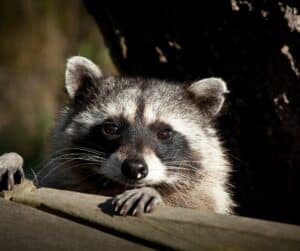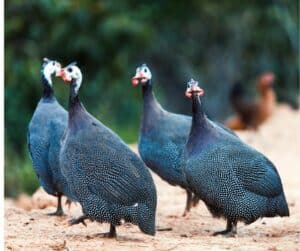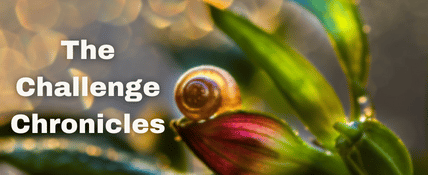
Nighttime marauder seeking a little tasty takeout from the bird coop.
We get a lot of wildlife trekking through our homestead: From deer and elk to coyotes and wild turkeys, at times our game trails seem like major highways.
You may have seen our Facebook post from July ’23, showing the neighborhood bear caught on our security camera. We often hear the local fox calling from across the pasture at dusk.
Skunk perfume occasionally drifts through the air on chilly mornings, and we’ve dealt with possums and raccoons attempting to self-serve from the chicken coop.
Aside from being fascinating, there are practical considerations:
Much of what lives in the woods around us would be happy to snack on the animals we raise.
So, we have developed routines and practices that help us keep everyone as safe as possible – while streamlining the effort (and energy) required.
In addition to the large Livestock Guardian dogs patrolling the place, we secure all the animals in predator-resistant quarters every evening.
Convincing animals to go into enclosures may seem more easily managed with sheep and goats, but surprisingly, the guinea fowl, chickens and peacocks all come in – willingly – during the routine we call “evening chores.”
Chickens are very domesticated and easily handled. Peacocks will follow you anywhere for corn or peanuts.
But the guineas are another matter.
Not as long-domesticated as chickens, they tend to be flighty and harder to engage. They’re much less likely to be a snuggle-buddy than a dog, cat or even a chicken.
Which means it can take more time and energy (translation: bandwidth) to manage them.
But with patience, gentle handling and consistency, they can be trained.

Guinea fowl flock
Achieving this means that we, the humans involved, had to learn what works best for the guineas so we could work with their natural inclinations.
For starters, they go to roost at dusk. We learned early on that as soon as the sun drops behind the western ridge and the shadows grow long across the pastures, we need to call the guineas in before they fly up into the trees to roost.
We also learned – the hard way- that when it snows, they become really skittish with all that cold white stuff on the ground.
During the first snowstorm after I started keeping guineas, several of them flew up into the trees and roosted there all night, with their little heads hunched way down into their shoulders in an effort to escape the cold.
I stood out in the swirling snow that evening, my minivan parked below them with headlights illuminating a landing strip, waving a long pole, scattering corn on the ground,…with no luck.
My fear was I would find bird-cicles either frozen to the branches the next morning or, as their little toes froze, that they had fallen out of the trees to become frozen treats for the night-prowling predators.
They made it through the storm relatively unscathed (there were some frost-bitten combs but no one lost toes) which was a relief.
The lessons learned in this journey of training guineas to adapt to routines intended to keep them safe and make life easier for all of us include:
Take action with mindful, informed timing
We’ve learned to get the birds to shelter at the first sign of frozen precip covering the ground, and if we don’t get a quick melt, scrape walkways for them so they can be reassured by seeing bare earth instead of cold white stuff everywhere.
Now we routinely gather the birds at dusk and during certain inclement weather events and it saves a lot of hassle – and bandwidth.
Establish appropriate expectations through procedures and consistency
We follow a consistent routine because their brains and nervous systems work better that way. They know to come looking for The Humans Who Feed Them at dusk and are usually milling around, waiting for us to get the feed out of the bins in the evenings.
Note also, built into this routine: Rewards for showing up, for engaging with us and for following where we lead. Having a team who will come when you call and follow where you lead is a massive bandwidth saver.
Acknowledge the natural rhythms and pacing of those you lead
We’ve learned to move slowly with the guineas, remaining mindful of their tendency to startle easily. This builds trust.
Gerald takes the time to bend down and offer a handful of cracked corn, and some of these flighty birds will now walk up to him and eat from his hands. They don’t do that with me because I don’t take the time to establish that relationship with them.
But – the fact that he does build that trust benefits me in my handling of them, as long as I don’t damage that trust.
It seems paradoxical: Moving slowly and mindfully, especially when I feel pushed for time, helps matters flow more smoothly and costs less time and energy (bandwidth) to achieve the desired outcomes.
Exercise authority (vs. force) and take action appropriately
We use a net if a guinea requires handling for vetting. Occasionally we’ll spot a bird limping and need to secure them to check feet and toes.
This required that we learn how to hold a guinea to administer care because they rarely stop fighting us when held, and their delicate bones damage very easily. It’s heart-wrenching when you are doing your best to provide assistance, only to inadvertently do damage because of the struggle.
It’s also frustrating to lose a bird (or any valued team member) because you don’t take action for fear of hurting someone. Learn how to take charge of a situation and act when needed, in the ways required, to minimize unnecessary losses. Losses use up bandwidth.
Remember why you make the effort
If we were not able to secure everyone at night, the flock would be decimated quickly. Even in the trees, they are at risk of being someone’s dinner: Many of the predators climb well, and owls have been known to pluck a guinea from an overnight perch.
It may seem like a lot of trouble to follow routines and procedures faithfully, but doing so helps ensure the welfare of all involved. Compromised welfare (wait for it) compromises bandwidth.
Manage your own energy.
On the evenings I am more amped up, pushing to get things done quickly, or if my energy is low and I lack my usual capacity to be present for them, the birds can tell.
And they respond accordingly: The harder I push to get them all inside their coop, the harder they will resist.
This means I must self-regulate, manage my own mood and energy so I don’t trigger them into becoming flighty.
Because once guineas become upset, they fragment and completely forget the routine and the trust that’s been developed over time.
Their capacity to remain connected and engaged gets disrupted as soon as their “I’m in danger” response kicks in, and all bets are off. Rounding up freaked-out birds is a massive bandwidth-buster for me, and more so if I’m already depleted.
Be realistic about your own limits and compassionate with your humanity
I have been known, while in this “being schooled in patience by guinea fowls” routine to become… frustrated on occasion.
Feed buckets may have been thrown.
It is possible I have said to a challenging guinea, on multiple occasions, “You. Are. Too. Stupid. To. Breed.”
These days, those incidents of Overdrawn Capacity are less frequent as I’ve learned to monitor and regulate myself so matters can proceed more smoothly in the barnyard.
Most evenings, I breeze through all bird-related chores in around 30 minutes, because of everything mentioned above.
As a result: Birds go to roost for the evening without any stressing on anyone’s part and I’m freed up to wander down the hill and lend a hand in the barn with the other animals.
The peaceful process with the birds frees up personal bandwidth / capacity that can be allocated elsewhere.
** ** **
A few things to note here:
- Meeting challenges or situations in which things don’t go smoothly, takes (additional) bandwidth.
- Challenges are part of life so we need to maintain – to the best of our abilities – the bandwidth to effectively meet those challenges, from smaller, daily challenges to the bigger ones that pop up unexpectedly.
- Navigating situations when they flow smoothly costs us less bandwidth, which gives us the lived experience of greater capacity – AND – at least as importantly –
- The processes and practices that help prevent unnecessary bandwidth expense can also help us build additional capacity.
- More bandwidth gives you more choice and opens up possibilities that can’t otherwise be accessed.
Bottom line: Life is easier when you have the bandwidth to meet what it asks of you.
When you are working from within generous inner capacities (built though mindful procedures and practices), your daily version of “evening chores” will be smoother, less demanding and less stressful which means you’ll have more reserves for the unexpected.
May all of your flocks and herds come when you all, and be gentle teachers in your bandwidth-building journeys –
![]()
** ** ** ** ** ** **
If you want to boost your personal bandwidth AND make them most of the bandwidth you already have, here’s how I can help:
- Get your personal bandwidth audit – This private review of your bandwidth allocation let’s us see where you may be losing bandwidth unnecessarily. We use this to craft your personal bandwidth building strategy so you can have more of what you want in your life. Contact me to learn how you can get your personal audit and get started with an intentional plan for building your essential capacities.
- Join a Pit Stop cohort – An intimate group coaching experience that offers you more than a resting place on the busy road of life. Women in the Pit Stop learn ways to monitor and manage personal bandwidth, for greater effectiveness and resilience. Contact me to schedule a time to talk, so we can see if the Pit Stop is the best option for you now.

